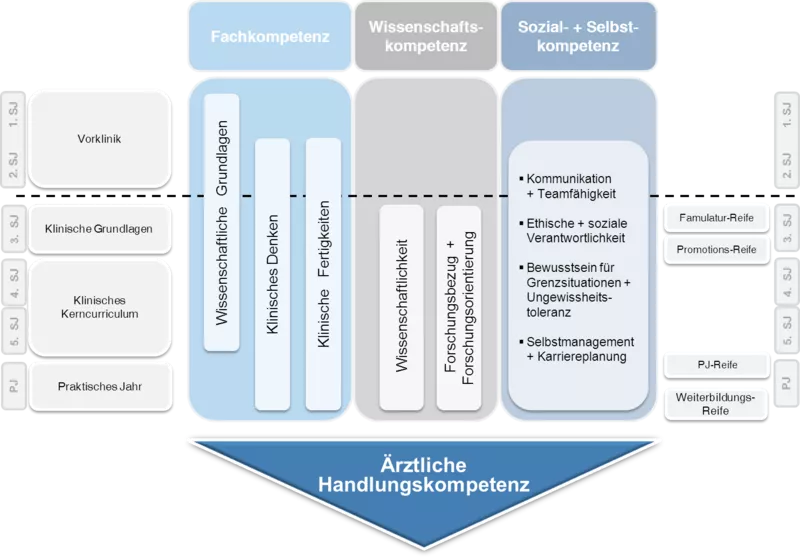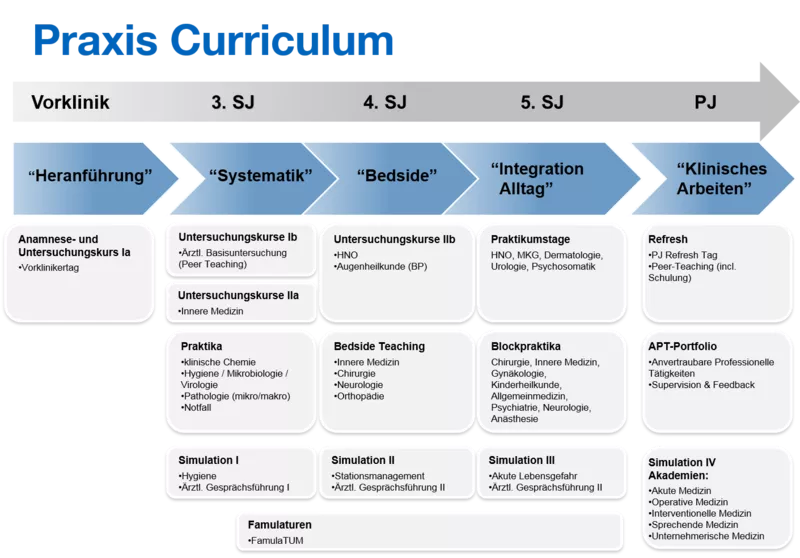Medical expertise
Since the winter term 2011/12, the curriculum of the Human Medicine degree programme at TUM has been based on a new curriculum concept. The main aim of this reform was to adapt teaching to the modern medical profession and to the new findings of medical didactics. The number of seminars and practical courses was continuously increased, with lectures based on modern didactic methods (interdisciplinary, case-based learning, converted classroom and team-based learning) continuing to form a central element.
Medical competence is to be achieved by teaching the three dimensions of professional competence, scientific competence and social and personal competence.
Even if the curriculum continues to be orientated towards the specialist disciplines, central courses will be interdisciplinary and problem- or case-based. The "professional competence" dimension is supported by two interlocking teaching and learning spirals: "clinical reasoning" and "clinical skills".

Clinical thinking
The continuous interdisciplinary lecture (IVL 1 - 3) throughout the first three clinical years of study forms the basis of "Clinical Thinking":
1st and 2nd clinical year of study
"Clinical Pathophysiology" (IVL 1) creates the transfer between the scientific principles of the preclinical phase and their application in the clinic in terms of principles and cases.
"Introduction to Clinical Medicine" (IVL 1) sensitises students to important and interdisciplinary topics in medicine (such as scientific practice, healthcare, etc.) right from the start.
From the 2nd semester of the 1st clinical year onwards, "Systematic Disease Theory" (IVL 2) is taught throughout the entire 2nd clinical year (i.e. over a total of three semesters): topic- or organ-related (heart/lung - blood - kidney - gastrointestinal - musculoskeletal), in an interdisciplinary approach (internal medicine - surgery/orthopaedics - pathology) systematically, but at the same time case-based
3rd clinical year
In the last two semesters before the "Practical Year" (PJ), the acquired system is repeated and consolidated in the "Clinical Management" part (IVL 3) on the basis of key symptoms (chest pain, weight loss, fever, etc.) in an interdisciplinary and case-based manner with a focus on direct application in everyday clinical practice.
Parallel to the IVLs, further clinical propaedeutic and clinical subjects are taught in subject-centred lectures and seminars. These also increasingly aim for an interdisciplinary orientation (e.g. neurosciences consisting of neurology and neurosurgery).
Practical year
Finally, centralised, structured courses in the practical year, such as the introductory lecture, subject-specific seminars and case-based emergency training (ShowTime), support practical training. The exam coaching programme "UltimaTUM" serves as optimal preparation for the oral state examination M3.
Clinical skills

Clinical skills are introduced to students in the practice curriculum at the beginning of the medical degree program.
Basic medical examination
The basic and essential skills of physical examination are systematically consolidated in the student tutorial of the first clinical year, the "Basic Medical Examination", which is conducted by specially trained and certified student tutors from the PJ. These skills are further consolidated in the "Specialised examinations" course taught by medical specialists.
Bedside teaching
In the 2nd year of clinical studies, bedside teaching focuses on the focussed and practical examination of individual patients and their clinical pictures. Students are directly confronted with the most common clinical pictures in various departments on a rotation basis.
Block internships and internship days
In the so-called block internships and internship days in the 3rd year of clinical studies ("Integration Alltag"), students are integrated into everyday clinical practice in small groups over several days to weeks. At the same time, seminars and internships are held to consolidate and deepen what has been learnt on a daily basis.
Training in a simulation-based learning environment
Since the 2014/15 winter semester, training in a simulation-based learning environment has been integrated as a building block in the practical part of the curriculum. This runs through the entire clinical section and includes topics such as hygiene, ward management and acute life-threatening situations.Skill refresh courses and topic-specific academies are also offered for students who are in their practical year at the TUM Medical Training Centre in order to further deepen their knowledge and skills and promote their interest.
Social & personal skills
The curriculum reform also brought further innovations in the interdisciplinary area of "social and self-competence": a "communication curriculum" covering all clinical years of study was created from the "medical communication" course, which has been successfully run on an interdisciplinary basis for several semesters.This curriculum will use simulated patients to train students in various aspects of doctor-patient communication, such as the principles of dialogue, dealing with emotions and taboo subjects and breaking bad news. Finally, topics of team and self-regulation will also be addressed.
Lettered Medicine / Lettered Medical Education
Finally, the LET ME programme should be mentioned.LET ME is the affirmative short form of our Lettered Medicine / Lettered Medical Education initiative.With this programme, we want to provide modern medicine, which is characterised by scientific complexity, rapid technical progress and economic efficiency, with an understanding that is as far-reaching as it is profound: An understanding of the inevitably subjective nature of human existence and its individual and social consequences.
Practical year ("Living and teaching")
Furthermore, depending on their subject-specific motivation and interests, students have the opportunity to apply their clinical thinking and skills directly in everyday clinical practice on a one-to-one basis and as a fully-fledged member of a clinical team in the final practical year ("Living and Teaching"). The new portfolio-based concept of the Entrustable Professional Skills (APT) is designed to support students individually and provide an optimal mix of structured and supervised training in this final year.